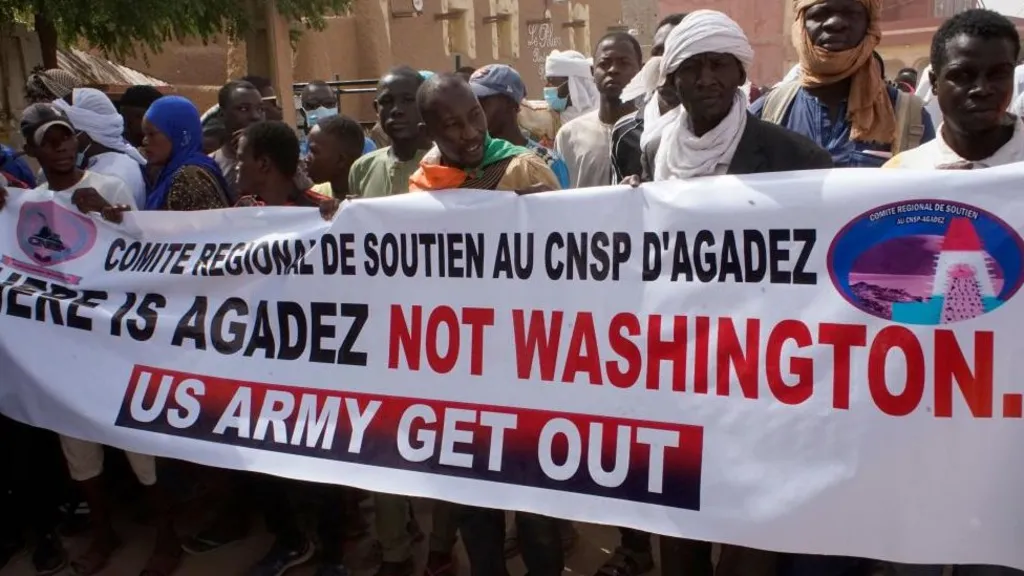Russian troops have been deployed to an airbase in Niger where American soldiers are located, US officials say.
The move comes after Niger’s military rulers ordered the US to withdraw troops who had been countering Islamic insurgents in the region.
Russian forces were present at the base in Niger’s capital Niamey, but were not mingling with American troops, US officials told the Reuters news agency.
Defence Secretary Lloyd Austin said the Russians posed no “risk” to US forces.
“The Russians are in a separate compound and don’t have access to US forces or access to our equipment,” Mr Austin told journalists in Honolulu, Hawaii.
“I’m always focused on the safety and protection of our troops… But right now, I don’t see a significant issue here in terms of our force protection,” the defence secretary added.
Niger is in Africa’s Sahel region, which is considered the new global epicentre of the Islamic State group.
The US has relied on the country as its primary base for monitoring regional jihadist activity, but its relations with the country’s ruling military regime have deteriorated since it condemned last year’s coup.
In turn, Niger has turned to Russia for assistance fighting Islamist insurgents in the south of the country.
The Russians deployed to Airbase 101 at Niger’s international airport in Niamey are said to be military trainers.
They are said to be occupying a wing close to a contingent of US troops.
According to Reuters, earlier this year officials in Niger told the US that about 60 Russian troops would be deployed to the country. It is unclear how accurate that figure is today.
It is also unclear how many American troops remain at Airbase 101.
Most of the US troops in Niger are said to be at a drone base in the central city of Agadez, some 750km (460 miles) north-east of Niamey.
Relations between the US and Russia have been deteriorating sharply since President Vladimir Putin launched a full-scale invasion of Ukraine in February 2022, with the US leading Western efforts to supply weapons to the Ukrainians.
But Paul Melly, West Africa analyst at the Chatham House think tank, says he sees no prospect of confrontation between the US and Russian troops.
Mr Melly the Americans had tried hard to remain in Niger, but that the country’s military leadership had rebuffed their attempts to link their security assistance to a timetable to return to civilian rule.
“For the junta, the attraction of the Russians is that they make no demands about governance and democratic rules,” Mr Melly said.
In March, Niger ordered all US troops to leave the country. Military spokesperson Col Amadou Abdramane accused the US of raising objections about the allies that Niger had chosen.
Mr Melly said that there was no evidence the Russians had been urging Niger – or Mali and Burkina Faso – to expel Western forces, but they were clearly taken advantage of the situation. And it remains unclear, he said, what contribution the Russians would make to Niger’s security.
The head of the US Africa Command has told the BBC the US is keen to remain engaged with Niger – as well as Chad.
Gen Michael Langley: ‘African countries can choose whom to partner up with’
Gen Michael Langley said that violent extremist organisations were the biggest threat to Africa’s stability.
On Wednesday, dozens of of troops pulled out of Chad, after the country’s military leaders raised concerns over their presence ahead of the 6 May elections.
Several other military-led countries in the Sahel region have also recently strengthened ties with Russia and cut them with France, the former colonial power, as they try to fight an Islamist insurgency in the region.
Gen Langley said that the “ultimate goal” of the US was to continue a dialogue with those countries that have been taken over by military regimes to get them “on a roadmap back to democracy”.
Last year, Niger and Burkina Faso – which also experienced recent military coups – announced they were following Mali in withdrawing from the G5 international force set up to fight Islamists in the region.
The three military-run countries have instead set up their own grouping – the Alliance of Sahel States.
